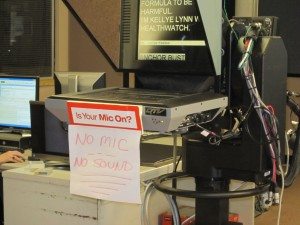 When mistakes happen on the air–and they will–how many television newsrooms have a clear-cut policy for handling corrections? A NewsLab survey of 220 TV journalists found that just over a third work at stations with guidelines covering both the timing and placement of on-air corrections for every kind of error.
When mistakes happen on the air–and they will–how many television newsrooms have a clear-cut policy for handling corrections? A NewsLab survey of 220 TV journalists found that just over a third work at stations with guidelines covering both the timing and placement of on-air corrections for every kind of error.
The survey found that most stations just aren’t that specific about what to do when bad information gets on the air.
No formal process
Two-thirds of the journalists responding to the survey said on-air corrections are made at their stations, at least some of the time. The trouble is that many of them could discern no formal process for determining when and how to issue a correction. As one respondent wrote, “We…treat each mistake differently.” Another called the station’s policy “catch as catch can.” A third respondent said on-air corrections are reserved only for the most serious mistakes. “If it is a major error with possible litigation involved we will run an on-air correction.” But this person added, “In three years I have only seen that happen three times.”
Most stations that do have specific guidelines say they try to correct errors in the same newscast as the mistake was made, if at all possible. “Major errors are corrected immediately on the air, or during the next newscast if it’s discovered after the show is completed,” one person wrote. Other newsrooms require more than one correction, in an effort to reach the same audience that heard or saw the mistake. “If a correction is necessary it airs in the same position in the same newscast in which the error occurred,” one respondent explained. Said another, “We try to correct the mistake in that same newscast and place it as high as the original story (we don’t bury corrections).”
But fully one out of five respondents said they work at a station where there either is no corrections policy, or where errors are treated as an internal matter to be handled in a post-mortem meeting or a discrepancy report. “There is no system for tracking script errors and following-up,” one person wrote. “Usually there are conversations between the individuals involved, and promises to do better next time. That’s it.” Another described the station’s corrections policy as “indifference.”
Why make corrections?
Why bother correcting errors? People who worked at stations with clear policies said it’s all about maintaining credibility. “You ‘must’ accept responsibility for errors,” one person wrote. “Your viewers respect you more for it.. they don’t expect you to be perfect.” As another respondent put it, “I strongly believe that acknowledging error makes us stronger, not weaker.”
Yet most stations apparently don’t go that far. Instead of acknowledging error by airing a correction, one person said, “more often another story would be done updating what ‘we’re now told.'” Another respondent said errors are treated differently depending on who spots them. “Unless a viewer points it out, usually the newsroom also overlooks it.” That was apparently the case in several newsrooms. As one person said, “Most errors are swept under the rug hoping no viewer calls us on it.”
The survey results suggest there is plenty of room for improvement in how TV newsrooms deal with on-air mistakes. Check these suggestions from a former network news manager.
1.This survey was conducted from June 7 to July 4, 2001. Responses were collected online.
2. Amy Mitchell of the Project for Excellence in Journalism helped to analyze the results. Contact her at asmitch@journalism.org








